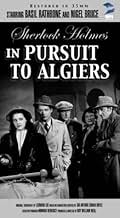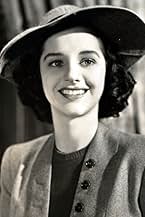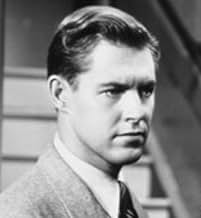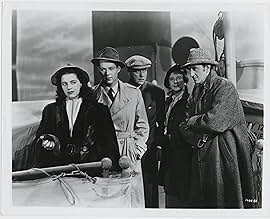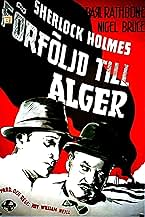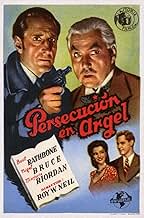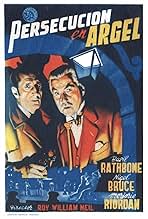IMDb RATING
6.7/10
4.4K
YOUR RATING
Holmes is recruited to escort the heir to a European throne safely back to his homeland after his father's assassination.Holmes is recruited to escort the heir to a European throne safely back to his homeland after his father's assassination.Holmes is recruited to escort the heir to a European throne safely back to his homeland after his father's assassination.
- Director
- Writers
- Stars
William 'Wee Willie' Davis
- Gubec
- (as Wee Willie Davis)
Frederick Worlock
- Prime Minister
- (as Frederic Worlock)
Wilson Benge
- Clergyman
- (uncredited)
Sven Hugo Borg
- Johansson
- (uncredited)
Ernst Brengt
- Ship Passenger
- (uncredited)
James Carlisle
- Aide
- (uncredited)
Ashley Cowan
- Steward
- (uncredited)
James Craven
- Anton Petzval
- (uncredited)
- Director
- Writers
- All cast & crew
- Production, box office & more at IMDbPro
Featured reviews
The definitive movie Sherlock Holmes is Basil Rathbone; the definitive movie Dr. Watson is Nigel Bruce. Together, these two brilliant actors made fourteen Sherlock Holmes films between 1939 and 1946, most of them loosely based on stories by Arthur Conan Doyle; a few based on Doyle stories in name only. All are thrilling, exciting excursions into the realm of mystery and deductive reasoning, even the later low-budget ones.
The original pairing of the super sleuth with his bumbling if lovable assistant portrayed by Rathbone and Bruce was in "The Hound of the Baskervilles," where star billing went to Richard Greene as Sir Henry Baskerville. The popularity of Holmes and Watson showed the studio that the audience cared more for the two supporting players than for the somewhat stiff Greene. Next time in "The Adventures of Sherlock Holmes," Rathbone and Bruce deservedly received top billing.
During World War II with England in peril from the Luftwaffe, Holmes and Watson were utilized to booster the war spirit. Holmes could be heard at the end of the war-time films haranguing his fellow countrymen and their ally, the United States, about patriotism and gallantry. Winston Churchill was touted as the savior of his nation.
"Pursuit to Algiers," based on Doyle's "The Return of Sherlock Holmes," finds the crafty detective helping escort Nikolas (Leslie Vincent), heir of a foreign country and a target for conspirators, to assume his crown following the assassination of his predecessor. There are many clever scenes involving Dr. Watson unknowingly being used as a decoy to protect Nikolas. When Nikolas' supporters first contact Holmes surreptitiously, they employ a ruse involving a fish and chips cypher, beyond Watson's grasp. In the process Watson is propositioned by a hooker who calls the good doctor, Ducky, much to his chagrin. Holmes takes the high road by plane; Watson takes the low road by boat. There is much chicanery aboard the ship that takes up most of the movie. The ending may come as a surprise for many.
One of the high points of "Pursuit to Algiers" is Watson's story of "The Giant Rat of Sumatra." Entreated by his fellow passengers to tell about one of Sherlock Holmes' greatest adventures, Watson volunteers to entertain all with his giant rat fable. His use of inanimate objects on the table for purposes of illustration to make the exploits he relates more colorful is well worth the price of admission.
There are more songs than usual for a Sherlock Holmes outing. Such traditional Scottish airs as "Flow Gently Sweet Afton," sung by Marjorie Riordan as a girl from Brooklyn named Sheila Woodbury with something hidden in her sheet music satchel and "Loch Lomond," sung by Watson himself, not only serve as icing but are utilized to embellish the plot.
The twelfth in the Sherlock Holmes series and coming at the end of the war, "Pursuit to Algiers" is one of the most entertaining of the lot and there is no rousing speechifying by Holmes at the end. Those speeches were wonderful morale buildings at the time, but are a bit quaint for today's audiences.
The original pairing of the super sleuth with his bumbling if lovable assistant portrayed by Rathbone and Bruce was in "The Hound of the Baskervilles," where star billing went to Richard Greene as Sir Henry Baskerville. The popularity of Holmes and Watson showed the studio that the audience cared more for the two supporting players than for the somewhat stiff Greene. Next time in "The Adventures of Sherlock Holmes," Rathbone and Bruce deservedly received top billing.
During World War II with England in peril from the Luftwaffe, Holmes and Watson were utilized to booster the war spirit. Holmes could be heard at the end of the war-time films haranguing his fellow countrymen and their ally, the United States, about patriotism and gallantry. Winston Churchill was touted as the savior of his nation.
"Pursuit to Algiers," based on Doyle's "The Return of Sherlock Holmes," finds the crafty detective helping escort Nikolas (Leslie Vincent), heir of a foreign country and a target for conspirators, to assume his crown following the assassination of his predecessor. There are many clever scenes involving Dr. Watson unknowingly being used as a decoy to protect Nikolas. When Nikolas' supporters first contact Holmes surreptitiously, they employ a ruse involving a fish and chips cypher, beyond Watson's grasp. In the process Watson is propositioned by a hooker who calls the good doctor, Ducky, much to his chagrin. Holmes takes the high road by plane; Watson takes the low road by boat. There is much chicanery aboard the ship that takes up most of the movie. The ending may come as a surprise for many.
One of the high points of "Pursuit to Algiers" is Watson's story of "The Giant Rat of Sumatra." Entreated by his fellow passengers to tell about one of Sherlock Holmes' greatest adventures, Watson volunteers to entertain all with his giant rat fable. His use of inanimate objects on the table for purposes of illustration to make the exploits he relates more colorful is well worth the price of admission.
There are more songs than usual for a Sherlock Holmes outing. Such traditional Scottish airs as "Flow Gently Sweet Afton," sung by Marjorie Riordan as a girl from Brooklyn named Sheila Woodbury with something hidden in her sheet music satchel and "Loch Lomond," sung by Watson himself, not only serve as icing but are utilized to embellish the plot.
The twelfth in the Sherlock Holmes series and coming at the end of the war, "Pursuit to Algiers" is one of the most entertaining of the lot and there is no rousing speechifying by Holmes at the end. Those speeches were wonderful morale buildings at the time, but are a bit quaint for today's audiences.
Since the wartime production (1945) of the Sherlock Holmes' adventure, "Pursuit to Algiers", many films have been made involving a seagoing setting. Mysteries set aboard a ship I suggest are notoriously easy to begin and difficult to consummate; this is because it is easy to introduce characters in a claustrophobic setting but notoriously more difficult to arrange for a series of logical events perpetrated by them that is varied, believable and possessed of a wide-enough scope of action. I find "Pursuit to Algiers" to be an unusually believable decently-filmed low-budget ship-based adventure and a tidy storyline without any need for apologies. The writers began the piece on land, in fact using a low-grade but intriguing series of clues--recognized by detective Sherlock Holmes as such--to lure him to an expositional meeting. At that meeting, the Prime Minister of a fictitious Balkan country, one whose king has been murdered (though this fact has not been made public), hires the famous consulting detective to safeguard the nation's young prince as he heads home from his school in England to his homeland for a now-vital coronation ceremony. Holmes accepts the commission; then he heads off in an airplane, planning to meet his friend Dr. Watson later, for several reasons. Watson has cause to believe he has been killed; but he eventually does meet his partner aboard the ship they had planned to sail on, after several neat plot twists and a display of unusual intelligence by Holmes; and from then on, the two are kept exceptionally busy trying to assess who the potential murderers are (who will be their deadly opponents). They are given a fairly large cast of suspects to choose from. Holmes then neatly thwarts the villains at every turn, until near the end he is knocked unconscious and the prince is kidnapped--exactly as Holmes had planned. Basil Rathbone is less effective than usual as Holmes and Nigel Bruce more useful as Watson than he was usually permitted to be; he sings beautifully, and acts as an effective comedic foil to his sharp-eyed and sharp-witted partner throughout. Among the larger than usual cast for a Holmesian adventure, Rosalind Ivan as a noisy matron is far better than thin, pretty Marjorie Riordan who sings better than she acts. Veteran heavies Martin Kosleck, John Abbott, Rex Evans and Gerald Hamer steal the film as clever but outwitted suspects or murderers; aboard such a small ship, the scenarists permit the suspects and even the villains to interact with and try to outthink Holmes quite directly, a rarity outside seagoing comedic tales (and, I find, the film's primary distinguishing feature). Frederick Worlock is affecting as the Prime Minister; the young men in the cast are all routine at best. This film was kept moving swiftly and ably by its producer-director, veteran Roy William Neill; the script was done as a screenplay by Leonard Lee adapted from elements of an Arthur Conan Doyle story. The feature's cinematography by Paul Ivano and art direction by John B. Goodman and Martin Obzina are above average; Vera West's costumes are done on an admirably high level throughout. Bernard Brown, for once, keeps a British film's voices and sounds perfectly intelligible. Some of the scenes aboard the ship are quite realistic; others are less successful, although Russell A. Gausman and Ralph Sylos try manfully to make every setting from a cafe to cramped staterooms believable. The seminal portions of this film I assert are the dialogue interactions of the characters which take place throughout; despite the dialogue sometimes being low-key, it is adult, convincing and serviceable from beginning to end. This is a very good second feature by my standards, if no more, on a par with The Woman in White, and quite tightly plotted.
The Sherlock Holmes Series is actually fun for the fans of Basil Rathbone and Nigel Bruce, but the individual films are a mixed bag as mysteries themselves. The best mysteries are THE SCARLET CLAW, THE HOUSE OF FEAR, THE ADVENTURES OF SHERLOCK HOLMES, THE HOUND OF THE BASKERVILLES, SHERLOCK HOLMES FACES DEATH. The ones about the war are mediocre - more like curiosities dealing with patriotism and the war effort. After the war the series resumed plots dealing with regular crime. The best of these was THE PEARL OF DEATH, but it was not up to the top five films. One of the final films was this one, PURSUIT TO ALGIERS.
Although all the other films were rewritten from the original Conan Doyle stories, PURSUIT TO ALGIERS was totally made up from a comment dropped in the original "Canon". Doyle wrote four novels and fifty six short stories about Holmes. But in this material (equal in size to say LES MISERABLES or DON QUIXOTE) were many little comments and statements that actually have helped lead to the myriad of essays and books by Holmes' fans. Among other things are the large number of cases of Holmes that he or Watson mention casually, but never write of. In this film, the untold story is "the affair of the steamship "Friesland" that so nearly cost us both our lives". It is mentioned in one of the stories of the series called THE RETURN OF SHERLOCK HOLMES, and is usually said to be set in 1895. The actions of PURSUIT TO ALGIERS take place on the steamship "Friesland", and do almost cost Holmes and Watson their lives, but this film is set after the end of World War II. Since there was no real short story that is nothing to be critical about.
Holmes is not in part of the film (and at one point it seems he has been killed), but he does appear about the middle, and he is in good form when he is. Witness the way he takes care of Martin Kosleck, and the way he makes a typically ironic comment to Kosleck as to why he was able to be prepared. Also the business about party favors is quite nicely done. So are the supporting parts - especially Bruce's comments regarding Rosalind Ivan and John Abbott and his partner. As an entertainment it is a fine film. As a mystery it really never gets very involving. We never understand who is in the background backing the anti-royal assassins. Presumably the Communists (this is 1945), but such a guess is based on the number of Eastern European monarchies that fell following the end of World War II. Still it would help to know who the super-villain is. But then Hitchcock always ignored the central rationales of his "MacGuffins". Why not on this lesser level then? So forget the pleasure of realism, sit back, and just enjoy the antics of the characters. And keep in mind, Basil and Nigel made only two other of these films afterward. It was nearly the end of the series for them and their fans.
Although all the other films were rewritten from the original Conan Doyle stories, PURSUIT TO ALGIERS was totally made up from a comment dropped in the original "Canon". Doyle wrote four novels and fifty six short stories about Holmes. But in this material (equal in size to say LES MISERABLES or DON QUIXOTE) were many little comments and statements that actually have helped lead to the myriad of essays and books by Holmes' fans. Among other things are the large number of cases of Holmes that he or Watson mention casually, but never write of. In this film, the untold story is "the affair of the steamship "Friesland" that so nearly cost us both our lives". It is mentioned in one of the stories of the series called THE RETURN OF SHERLOCK HOLMES, and is usually said to be set in 1895. The actions of PURSUIT TO ALGIERS take place on the steamship "Friesland", and do almost cost Holmes and Watson their lives, but this film is set after the end of World War II. Since there was no real short story that is nothing to be critical about.
Holmes is not in part of the film (and at one point it seems he has been killed), but he does appear about the middle, and he is in good form when he is. Witness the way he takes care of Martin Kosleck, and the way he makes a typically ironic comment to Kosleck as to why he was able to be prepared. Also the business about party favors is quite nicely done. So are the supporting parts - especially Bruce's comments regarding Rosalind Ivan and John Abbott and his partner. As an entertainment it is a fine film. As a mystery it really never gets very involving. We never understand who is in the background backing the anti-royal assassins. Presumably the Communists (this is 1945), but such a guess is based on the number of Eastern European monarchies that fell following the end of World War II. Still it would help to know who the super-villain is. But then Hitchcock always ignored the central rationales of his "MacGuffins". Why not on this lesser level then? So forget the pleasure of realism, sit back, and just enjoy the antics of the characters. And keep in mind, Basil and Nigel made only two other of these films afterward. It was nearly the end of the series for them and their fans.
I've seen nearly all of Universal's Sherlock Holmes series by now, and have found that the level of quality doesn't vary too much between each instalment. Every entry in the series is worth watching, and I haven't seen any that I would describe as 'bad'. Pursuit to Algiers fits into this equation snugly, but even so; it's definitely one of the lesser Holmes mysteries. It does feature most of what makes the series great beyond the central plot line - such as a great performance from both the leads, a constant stream of intrigue and some great dialogue; but the actual mystery itself is rather lazy. It simply follows Holmes and Watson looking after a prince onboard a ship full of assassins. Adding to this is the fact that the sets are fairly samey, which doesn't help the film as it a few changes of scenery wouldn't have gone amiss. The film seems to know that it isn't the greatest of Holmes mysteries as well; and this translates to the screen. Holmes himself doesn't appear in the film for a proportion of the running time, which is never good when he's the main reason people are watching; and as good as Nigel Bruce is, he's not enough to carry a film about the great literary detective all on his own. I much prefer it when LeStrade features as well. Still, despite it's bad points, Pursuit to Algiers is a worthy yarn and still worth seeing for fans of these films.
Please make sure and get the UCLA restored version of this classic on DVD. There are some appalling Public Domain versions of the Rathbone/Bruce series floating about, especially in the U.K., which seem to have been ripped from poor quality VHS tapes, and they're worse than VCD quality. You'll certainly enjoy this series even more if you see them in good quality prints. Pursuit To Algiers is not the best of the series - that honour goes to SH and the Spider Woman - but it's very certainly worth watching, as it contains some delightful moments, although the storyline is a bit thin. Poor old Watson is put upon, as usual, while Holmes has, at least, the sense to keep his hair tidily back-combed in this episode, unlike others in the series where his barnet is all over the place. This is one to come back to again and again - a cosy evening in front of the fire, and Holmes and Watson off on a chase. But remember! Do yourself and your family a favour and get the RESTORED version. Avoid the market cheapies!
Did you know
- TriviaThe film contains a couple of clever in-jokes for Holmes aficionados in the form of references to famous unrecorded cases for the Great Detective: at one point Watson begins to recite the tale of The Giant Rat of Sumatra (mentioned in Conan Doyle's "The Adventure of the Sussex Vampire"); whilst the action takes place aboard the S.S. Friesland (from Conan Doyle's "The Adventure of the Norwood Builder", and alluded to as "a Dutch-American liner" in his Professor Challenger book "The Lost World", though here it has links to Malmö in Sweden). The film also borrows some characters and events from "The Adventure of the Red Circle."
- GoofsDr Watson discovers an automatic pistol --- i.e., one with a slide-in ammo-clip instead of a rotating cylinder --- in a lady passenger's handbag. He consistently refers to the handgun as a revolver. An ex-Army officer like Watson, no matter how daft, would never make such an "obvious" mistake.
- Quotes
Sherlock Holmes: Possibly, poison is a woman's weapon.
- ConnectionsEdited into Who Dunit Theater: Sherlock Holmes and Pursuit to Algiers (2021)
- How long is Pursuit to Algiers?Powered by Alexa
Details
- Release date
- Country of origin
- Language
- Also known as
- Sherlock Holmes in Pursuit to Algiers
- Filming locations
- Production company
- See more company credits at IMDbPro
- Runtime
- 1h 5m(65 min)
- Color
- Aspect ratio
- 1.37 : 1
Contribute to this page
Suggest an edit or add missing content

